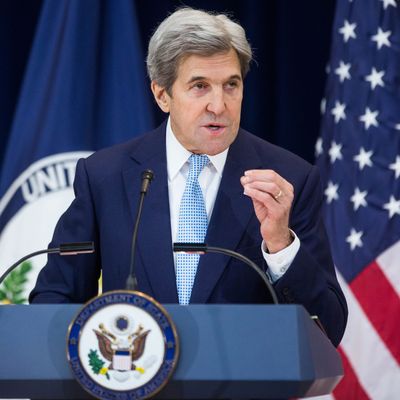
In a long (and long-planned) speech in Washington, outgoing secretary of State John Kerry provided a “vision” for peace in the Middle East. But the only thing likely to get much attention were his comments defending the decades-old linchpin of Israeli-Palestinian negotiations, the “two-state solution.” Deploying a directness unusual for diplomats (and this could be the final “big speech” of a long career), Kerry warned the Israeli government of Benjamin Netanyahu not to abandon the two-state solution at the behest of extremist elements in his electoral coalition who favor an annexation of occupied territories:
“The Israeli prime minister publicly supports a two-state solution, but his current coalition is the most right wing in Israeli history, with an agenda driven by its most extreme elements,” Kerry said. “The result is that policies of this government — which the prime minister himself just described as ‘more committed to settlements than any in Israel’s history’ — are leading in the opposite direction, towards one state.”
But you have to figure he knew that abandonment is all but a fait accompli, partly because the Trump administration is likely to give it international cover. Otherwise Kerry’s speech itself, along with the U.S. abstention last week on a U.N. Security Council resolution condemning West Bank and East Jerusalem settlements as illegal, might precipitate the move if it were not already happening.
Kerry’s — and, for that matter, the Obama administration’s — motives in directly taking on Netanyahu, and indirectly Trump, were probably mixed. His pleas for the continuation of the two-state solution seem to be addressed to some future Israeli government that will be willing to return to the negotiating table (indeed, Israeli opposition leaders praised Kerry’s speech even as Netanyahu and his allies assailed it as “skewed” and “pathetic”). But beyond that, the Obama administration, particularly in the wake of the furor over the U.N. vote, needed to make a highly visible argument that it is Israel, not the U.S., that has abandoned the status quo ante.
Kerry’s speech makes the basic point that Israel’s current posture is inherently incompatible with the two-state solution: “The status quo is leading towards one state and perpetual occupation.” But as one of Kerry’s former negotiators (and former U.S. ambassador to Israel) Martin Indyk noted at Politico today, there’s a tangible step that Israel is on the brink of taking that could make a two-state solution even more impracticable:
[T]he settler movement, encouraged by the prospect of a Trump administration they believe will be sympathetic to their aspirations, is pushing the current Netanyahu government to pass legislation that will legalize all these outposts. The Knesset has already passed the first reading of the bill and Netanyahu has pledged to support it.
This, not the false charge of hostility to Israel, is why the Obama administration abstained on United Nations Security Council Resolution 2334, which challenged the legal validity of all the settlements. For the past year, the Obama administration has warned the Israeli government, and criticized and condemned new settlement activity, including a new settlement established in the northern West Bank the day after Obama attended the funeral of Shimon Peres, a towering statesman and peacemaker. Those objections were systematically ignored.
While Netanyahu and Trump and their mouthpieces will continue to claim that Obama and Kerry suddenly and vindictively stabbed Israel in the back as they left the world scene, the real effect of Kerry’s speech may be to give Israelis (and supporters of Israel in the U.S. and elsewhere) who still believe in a two-state solution something they can agree with even if they thought the U.N. abstention was not a good idea. It’s hardly the breakthrough Kerry long hoped for, but it may be the best he can manage now.






























